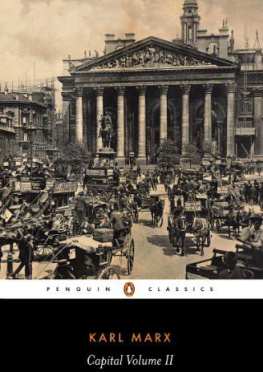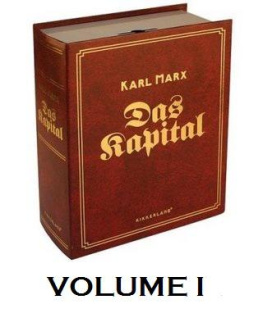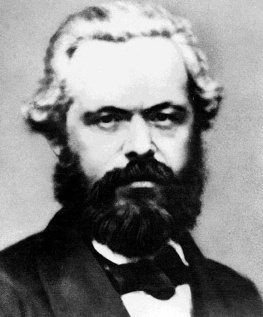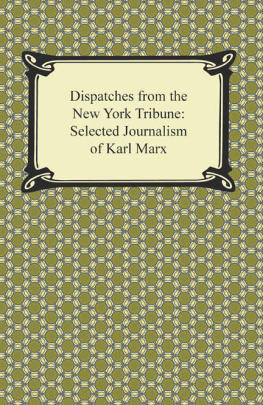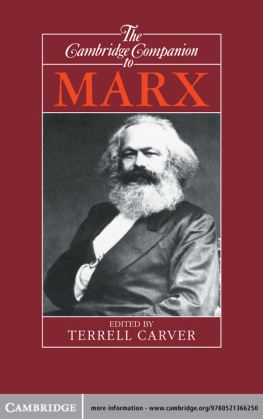Karl Marx - Selected Correspondence of Karl Marx and Frederick Engels
Here you can read online Karl Marx - Selected Correspondence of Karl Marx and Frederick Engels full text of the book (entire story) in english for free. Download pdf and epub, get meaning, cover and reviews about this ebook. year: 2014, publisher: Marxists Internet Archive, genre: Detective and thriller. Description of the work, (preface) as well as reviews are available. Best literature library LitArk.com created for fans of good reading and offers a wide selection of genres:
Romance novel
Science fiction
Adventure
Detective
Science
History
Home and family
Prose
Art
Politics
Computer
Non-fiction
Religion
Business
Children
Humor
Choose a favorite category and find really read worthwhile books. Enjoy immersion in the world of imagination, feel the emotions of the characters or learn something new for yourself, make an fascinating discovery.
- Book:Selected Correspondence of Karl Marx and Frederick Engels
- Author:
- Publisher:Marxists Internet Archive
- Genre:
- Year:2014
- Rating:3 / 5
- Favourites:Add to favourites
- Your mark:
- 60
- 1
- 2
- 3
- 4
- 5
Selected Correspondence of Karl Marx and Frederick Engels: summary, description and annotation
We offer to read an annotation, description, summary or preface (depends on what the author of the book "Selected Correspondence of Karl Marx and Frederick Engels" wrote himself). If you haven't found the necessary information about the book — write in the comments, we will try to find it.
Selected Correspondence of Karl Marx and Frederick Engels — read online for free the complete book (whole text) full work
Below is the text of the book, divided by pages. System saving the place of the last page read, allows you to conveniently read the book "Selected Correspondence of Karl Marx and Frederick Engels" online for free, without having to search again every time where you left off. Put a bookmark, and you can go to the page where you finished reading at any time.
Font size:
Interval:
Bookmark:
Selected Correspondence of Marx and Engels
Over 900 letters selected from the complete correspondence.
From http://www.marxists.org/archive/marx/letters/index.htm
Converted to eBook by Andrew Lannan
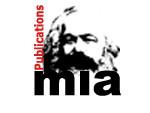

Engels - To My Grandfather
Source: MECW Volume 2, p. 553
First published: F. Engels, Schriften der Frhzeit , Berlin, 1920;
Transcribed: Andy Blunden;
Barmen, December 20, 1833
O you dear Grandfather, who always treat us so kindly,Always helping us when our work isnt going so smoothly,
While you were here, you told me many a beautiful story
Of Cercyon and Theseus, and Argus the hundred-eyed monster,
The Minotaur, Ariadne, and Aegeus drowned in the ocean,
The Golden Fleece, the Argonauts and Jason defiant
Mighty Hercules, Danaus, and Cadmus the hero,
And I cant remember all of the things that you told me;
Well, I wish you, Grandfather, a Happy New Year and a gay one,
Long, long years to come, with plenty of joy and no worries,
Everything good in life that can possibly happen to people,
All this is wished for you by your loving, affectionate grandson.
Friedr. Engels
Marx - Reflections of a Young Man
on The Choice of a Profession
Source: MECW Volume 1
Written: between August 10 and 16, 1835
First published: in Archiv fr die Geschichte des Sozialismus und der Arbeiterbewegung, 1925
Translated from the Latin.
Transcribed: by Sally Ryan.
Nature herself has determined the sphere of activity in which the animal should move, and it peacefully moves within that sphere, without attempting to go beyond it, without even an inkling of any other. To man, too, the Deity gave a general aim, that of ennobling mankind and himself, but he left it to man to seek the means by which this aim can be achieved; he left it to him to choose the position in society most suited to him, from which he can best uplift himself and society.
This choice is a great privilege of man over the rest of creation, but at the same time it is an act which can destroy his whole life, frustrate all his plans, and make him unhappy. Serious consideration of this choice, therefore, is certainly the first duty of a young man who is beginning his career and does not want to leave his most important affairs to chance.
Everyone has an aim in view, which to him at least seems great, and actually is so if the deepest conviction, the innermost voice of the heart declares it so, for the Deity never leaves mortal man wholly without a guide; he speaks softly but with certainty.
But this voice can easily be drowned, and what we took for inspiration can be the product of the moment, which another moment can perhaps also destroy. Our imagination, perhaps, is set on fire, our emotions excited, phantoms flit before our eyes, and we plunge headlong into what impetuous instinct suggests, which we imagine the Deity himself has pointed out to us. But what we ardently embrace soon repels us and we see our whole existence in ruins.
We must therefore seriously examine whether we have really been inspired in our choice of a profession, whether an inner voice approves it, or whether this inspiration is a delusion, and what we took to be a call from the Deity was self-deception. But how can we recognise this except by tracing the source of the inspiration itself?
What is great glitters, its glitter arouses ambition, and ambition can easily have produced the inspiration, or what we took for inspiration; but reason can no longer restrain the man who is tempted by the demon of ambition, and he plunges headlong into what impetuous instinct suggests: he no longer chooses his position in life, instead it is determined by chance and illusion.
Nor are we called upon to adopt the position which offers us the most brilliant opportunities; that is not the one which, in the long series of years in which we may perhaps hold it, will never tire us, never dampen our zeal, never let our enthusiasm grow cold, but one in which we shall soon see our wishes unfulfilled, our ideas unsatisfied, and we shall inveigh against the Deity and curse mankind.
But it is not only ambition which can arouse sudden enthusiasm for a particular profession; we may perhaps have embellished it in our imagination, and embellished it so that it appears the highest that life can offer. We have not analysed it, not considered the whole burden, the great responsibility it imposes on us; we have seen it only from a distance, and distance is deceptive.
Our own reason cannot be counsellor here; for it is supported neither by experience nor by profound observation, being deceived by emotion and blinded by fantasy. To whom then should we turn our eyes? Who should support us where our reason forsakes us?
Our parents, who have already travelled life's road and experienced the severity of fate - our heart tells us.
And if then our enthusiasm still persists, if we still continue to love a profession and believe ourselves called to it after we have examined it in cold blood, after we have perceived its burdens and become acquainted with its difficulties, then we ought to adopt it, then neither does our enthusiasm deceive us nor does overhastiness carry us away.
But we cannot always attain the position to which we believe we are called; our relations in society have to some extent already begun to be established before we are in a position to determine them.
Our physical constitution itself is often a threatening obstacle, and let no one scoff at its rights.
It is true that we can rise above it; but then our downfall is all the more rapid, for then we are venturing to build on crumbling ruins, then our whole life is an unhappy struggle between the mental and the bodily principle. But he who is unable to reconcile the warring elements within himself, how can he resist life's tempestuous stress, how can he act calmly? And it is from calm alone that great and fine deeds can arise; it is the only soil in which ripe fruits successfully develop.
Although we cannot work for long and seldom happily with a physical constitution which is not suited to our profession, the thought nevertheless continually arises of sacrificing our well-being to duty, of acting vigorously although we are weak. But if we have chosen a profession for which we do not possess the talent, we can never exercise it worthily, we shall soon realise with shame our own incapacity and tell ourselves that we are useless created beings, members of society who are incapable of fulfilling their vocation. Then the most natural consequence is self-contempt, and what feeling is more painful and less capable of being made up for by all that the outside world has to offer? Self-contempt is a serpent that ever gnaws at one's breast, sucking the life-blood from one's heart and mixing it with the poison of misanthropy and despair.
An illusion about our talents for a profession which we have closely examined is a fault which takes its revenge on us ourselves, and even if it does not meet with the censure of the outside world it gives rise to more terrible pain in our hearts than such censure could inflict.
If we have considered all this, and if the conditions of our life permit us to choose any profession we like, we may adopt the one that assures us the greatest worth, one which is based on ideas of whose truth we are thoroughly convinced, which offers us the widest scope to work for mankind, and for ourselves to approach closer to the general aim for which every profession is but a means - perfection.
Next pageFont size:
Interval:
Bookmark:
Similar books «Selected Correspondence of Karl Marx and Frederick Engels»
Look at similar books to Selected Correspondence of Karl Marx and Frederick Engels. We have selected literature similar in name and meaning in the hope of providing readers with more options to find new, interesting, not yet read works.
Discussion, reviews of the book Selected Correspondence of Karl Marx and Frederick Engels and just readers' own opinions. Leave your comments, write what you think about the work, its meaning or the main characters. Specify what exactly you liked and what you didn't like, and why you think so.



